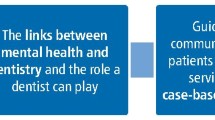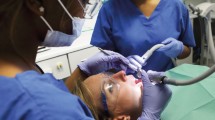Abstract
Background Extensive literature covers the relationship between psychiatric and dental health, but little research explores the ability of dental practitioners to confidently address patient mental health. This paper explored self-reported confidence of dental students when addressing patient mental health in a university setting.
Methods Mixed-method approach involving a quantitative scenario-based survey and focus groups. Research participants were from years three, four and five of the Bachelor of Dental Surgery (BDS) degree.
Results Survey data showed low confidence among dental students. Focus group themes included lack of education, prejudice and rejecting responsibility. Participants suggested communication skills workshops to help improve confidence.
Discussion Self-reported confidence among dental students when addressing patient mental health was low, echoing wider literature findings. Focus groups highlighted an absence of patient mental health from the curriculum. Systematic reviews have recommended greater education around screening tools for 'assessing psychological comorbidity'. Using best practice, focus group data and psychologist guidance, we developed a communication skills case-based workshop for service improvement.
Conclusion Low student confidence likely originates from limited focus within the BDS curriculum. The research will be expanded into other UK dental schools to explore the confidence of dental students nationally and to evaluate and trial the developed workshop.
This is a preview of subscription content, access via your institution
Access options
Subscribe to this journal
Receive 24 print issues and online access
$259.00 per year
only $10.79 per issue
Buy this article
- Purchase on Springer Link
- Instant access to full article PDF
Prices may be subject to local taxes which are calculated during checkout


Similar content being viewed by others
References
NHS Digital. Mental Health and Wellbeing in England: Adult Psychiatric Morbidity Survey 2014. 2014. Available at https://files.digital.nhs.uk/pdf/q/3/mental_health_and_wellbeing_in_england_full_report.pdf (accessed July 2019).
Mental Health Foundation. Fundamental Facts About Mental Health 2016. 2016. Available online at https://www.mentalhealth.org.uk/publications/fundamental-facts-about-mental-health-2016 (accessed July 2019).
Freeman R. Have dentists a role in identifying mentally ill patients? Br Dent J 2001; 191: 621.
Mind. Mental Health in Primary Care: A briefing for Clinical Commissioning Groups June 2016. 2016. Available at https://www.mind.org.uk/media/4556511/13296_primary-care-policy_web_op.pdf (accessed October 2019).
National Institute for Mental Health in England. Improving Access to Psychological Therapies (IAPT) Commissioning Toolkit. 2007. Available at https://www.uea.ac.uk/documents/246046/11991919/IAPT+Commissioning+Toolkit+2008+.pdf/cc6a4f24-dc6b-45d9-a631-ffdd075c6f0a (accessed October 2019).
BSDH Working Group (Griffiths J, Jones V, Leeman I et al). Oral Health Care for People with Mental Health Problems: Guidelines and Recommendations. 2000. Available at http://www.bsdh.org/documents/mental.pdf (accessed July 2019).
Kisely S. No Mental Health without Oral Health. Can J Psychiatry 2016; DOI: 10.1177/0706743716632523.
Johansson A, Norring C, Unell L, Johansson A. Eating disorders and oral health: a matched case-control study. Eur J Oral Sci 2012; 120: 61-68.
Teddlie C., Yu F. Mixed methods sampling: A typology with examples. J Mixed Methods Res 2007; DOI: 10.1177/1558689806292430.
Braun V, Clarke V. Using thematic analysis in psychology. Qual Res Psychol 2006; 3: 77-101.
Häggman-Henrikson B, Ekberg E, Ettlin D et al. Mind the Gap: A Systematic Review of Implementation of Screening for Psychological Comorbidity in Dental and Dental Hygiene Education. J Dent Educ 2018; 82: 1065-1076.
Author information
Authors and Affiliations
Corresponding author
Ethics declarations
There are no conflicts of interest to declare.
Rights and permissions
About this article
Cite this article
Elliott, E., Sharma, S., Omar, A. et al. How confidently do students address patients with psychiatric conditions in the dental clinic? A service evaluation in a UK dental school. Br Dent J 228, 376–380 (2020). https://doi.org/10.1038/s41415-020-1319-y
Published:
Issue Date:
DOI: https://doi.org/10.1038/s41415-020-1319-y
This article is cited by
-
Eating disorders and the role of the dental team
British Dental Journal (2023)
-
Should suicide risk assessment be embedded in undergraduate dental curricula?
British Dental Journal (2023)
-
Author Q&A: Emma Elliott
British Dental Journal (2022)
-
A multi-centre early evaluation of the effectiveness of workshop teaching to improve the confidence of UK and Irish dental students when addressing patient mental health
British Dental Journal (2021)



